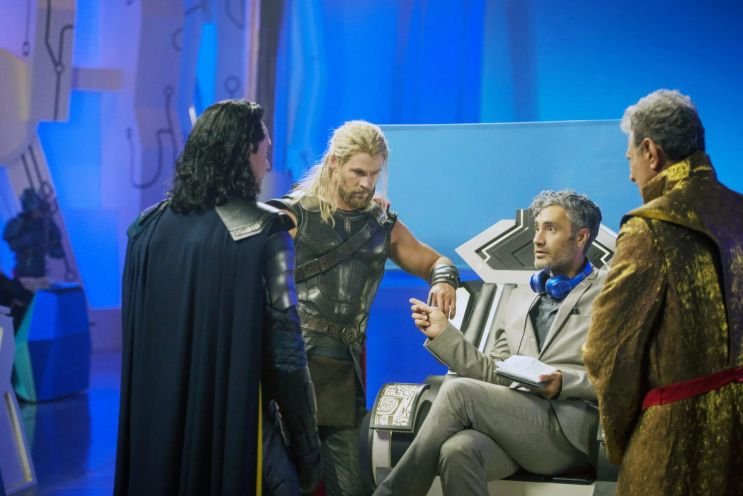Taika Waititi

En el universo del cine contemporáneo, pocos nombres han logrado atravesar con la misma soltura el cine independiente, las megaproducciones de estudio y la sátira social como Taika Waititi. Nacido en 1975 en Raukokore, un pequeño asentamiento costero de la Isla Norte de Nueva Zelanda, Waititi ha hecho de su herencia cultural, su sentido del humor afilado y su sensibilidad política una trilogía inseparable que estructura cada una de sus obras. Su carrera está atravesada por una sensibilidad política a la narración de historias con corazón, con un enfoque singular que logra conmover y desafiar al espectador sin renunciar jamás a la risa.
Las raíces: un mestizaje como punto de partida
Hijo de madre judía y padre maorí, Waititi creció en un entorno donde el cruce cultural no era una idea abstracta, sino una experiencia vivida cotidianamente. Esa convivencia entre orígenes dispares alimentó desde temprano su mirada híbrida, su habilidad para no ubicarse del todo en ningún extremo. Este mestizaje no solo le dio herramientas para abordar temas complejos con naturalidad, sino que también se volvió una de las fuentes más poderosas de su impulso creativo.
Durante sus años en la Universidad Victoria de Wellington, donde estudió arte y teatro, comenzó a consolidar un lenguaje propio que mezclaba la expresividad escénica con una aproximación visual singular. Sus primeras obras combinaban performance, ilustración y escritura, pero el salto al cine llegaría con fuerza a través del cortometraje Two Cars, One Night (2004), nominado al Oscar y primer indicio de lo que vendría.
Humor como refugio y arma
A diferencia de otros cineastas que separan comedia y drama como géneros opuestos, Waititi los entrelaza en un diálogo constante. En Boy (2010) o Hunt for the Wilderpeople (2016), por ejemplo, la risa emerge como una forma de resistencia ante la orfandad, la exclusión o el fracaso. No se trata de comedia ligera sino de una forma de afrontar la dureza con dignidad. La mirada infantil, la música pop ochentosa, los paisajes rurales de Nueva Zelanda: todos elementos que construyen una estética profundamente personal.
Esta particular sensibilidad no pasó desapercibida en Hollywood. Marvel Studios lo convocó para revitalizar la saga de Thor con Thor: Ragnarok (2017). Contra todo pronóstico, Waititi no solo reformuló el personaje, sino que lo hizo llevándolo al terreno del absurdo con un riesgo inusual para una franquicia de ese tamaño. Su rol como director, guionista y también actor (interpretando a Korg) le permitió imprimir una marca indeleble que renovó completamente la percepción de la saga.
Jojo Rabbit y la sátira como puente político
En 2019 llegó uno de los momentos más significativos de su carrera con Jojo Rabbit, una sátira ambientada en la Alemania nazi donde Waititi interpreta a una versión caricaturesca de Hitler. Basada en la novela de Christine Leunens, la película aborda el fanatismo, la guerra y el racismo desde la mirada de un niño. El desafío fue enorme: equilibrar lo cómico y lo trágico sin desdibujar la gravedad del contexto.
La película ganó el Oscar al Mejor Guion Adaptado y consolidó su lugar como uno de los narradores más originales de su generación. Pero más allá de los premios, Jojo Rabbit reveló cómo la pasión de Waititi por visibilizar los efectos del odio y la intolerancia encuentra en la comedia una herramienta de disrupción profundamente política.
Compromiso con las historias subrepresentadas
A lo largo de su carrera, Waititi ha defendido con firmeza la necesidad de visibilizar voces marginadas. Su trabajo con comunidades indígenas y su impulso a proyectos realizados por cineastas maoríes e isleños del Pacífico es una constante. En sus discursos públicos, entrevistas y redes sociales, no duda en abordar temas como el colonialismo, la discriminación o la gentrificación cultural con un tono que combina acidez, claridad y honestidad.
En 2022 estrenó Next Goal Wins, una comedia basada en hechos reales sobre la selección de fútbol de Samoa Americana, uno de los equipos con peor desempeño histórico. Nuevamente, elige contar una historia desde los márgenes, priorizando el valor humano por encima del espectáculo.
Vida personal y equilibrio en el caos
La dedicación de Waititi al cine está acompañada por una vida personal que también refleja su eclecticismo. Padre de dos hijas, mantiene un vínculo activo con la cultura neozelandesa y maorí, tanto en lo cotidiano como en su trabajo. En 2022 formalizó su relación con la cantante Rita Ora, con quien comparte una mirada creativa afín.
A pesar de su creciente exposición mediática, Waititi no ha perdido su tono desenfadado ni su cercanía con sus raíces. Sus producciones alternan el cine de estudio con proyectos independientes, y su enfoque sigue priorizando lo narrativo por encima de lo técnico o comercial.
Una trayectoria construida con autenticidad
Taika Waititi no busca agradar ni encajar. Su obra no responde a fórmulas, y eso la vuelve impredecible y valiosa. Cada película que firma es una invitación a mirar el mundo desde una perspectiva poco habitual, donde lo cómico y lo doloroso conviven con naturalidad. Su pasión se expresa en cada encuadre, cada diálogo, cada decisión estética. No como un artificio, sino como una forma de estar en el mundo, de contar lo que muchos prefieren callar, y de recordarnos —con ternura o ironía— que incluso en medio del desastre, todavía hay lugar para una buena historia.
